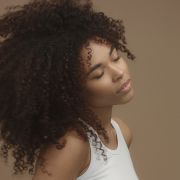We all know that gorgeous people get preferential treatment. It’s a not-too-pretty fact of life long attributed to the halo effect, a type of cognitive bias or judgment discrepancy in which our impression of a person dictates the assumptions we make about that individual. For example, people will more readily blame an unattractive person for a crime than an attractive one. Now there’s evidence that beauty, intelligence, and other positive characteristics may go hand in hand.

Evolutionary psychologists have opened a line of inquiry into other age-old questions about beauty, observing that both men and women alike appear more concerned than ever with both attractiveness and perceived physical imperfections. It’s no surprise that a pretty woman will tend to be favored over others for a desired job opening. And there are some universal standards of beauty across the world--symmetry in the face and the body are preferred traits, for example, as are clear skin and youthfulness.
Unfortunately, yes. We like to say that kindness and looks matter more, and that we appreciate what's on the inside most. But that is not exactly the case, we live by the notion that beautiful is best. In fact, even children are drawn to aesthetically pleasing faces, as opposed to unattractive and asymmetric ones.
Truthfully, attractive people are afforded higher pay, more opportunities, special treatment, a free pass so to speak. In fact, the more attractive you are the higher chance of getting to the head of the line. Plus, the better-looking student is considered more competent and enjoys higher grades, as well.
There are drawbacks to being beautiful. A person with a gorgeous face is often deemed incompetent and less likely to be hired. These people are also often the target of jealousy and exclusion. And in the dating scene, a person with extraordinary looks will get passed over as unattainable.
This preference for attractiveness can be found across domains, including politics, media, and the legal field. Beautiful people are also hired sooner, get promotions more quickly, are higher-ranking in their companies, and receive extra benefits and perks on the job.
Research shows that attractive people earn more than people with below-average looks, which adds up to a significant amount of money over a lifetime. The public would rather deal with a good-looking shop clerk rather than a less visually appealing one.
The halo effect causes a trait, such as beauty, to drastically color your perception of all other traits. If you think someone is beautiful, you are also likely to assume they’re smart, ambitious, and interesting.

While a new haircut, a little powder, and knowing what others find attractive might help you put on a good face, there are inner factors at play. A better foundation to build on is being confident, positive, and engaged with life. Feeling good about who you are will change the way you feel, move your body, and relate to others.
This is a cliche, but beauty is often in the eyes of the beholder. What is deemed attractive to one person may not be so for another. However, a conventional and symmetric face is generally considered appealing. Also, people are often drawn to what is familiar. For example, people who grew up in the same neighborhood are commonly attracted to each other.
Most people are far too critical of their own physical appearance, especially those who engage in self-downing or negative self-talk, which can and should be challenged. It is important to also focus on non-physical aspects of one's desirability, such as warmth, character and personality. When evaluating your attractiveness to potential partners, recognize that most individuals weigh all these factors and more in seeking relationships.
While heterosexual women also seek symmetry in male partners' features as well as height, they generally value status and resources at least as much, focusing on the question of whether a man will help them raise and support their future children.
Heterosexual men more strongly desire women with hourglass-shaped figures as well as feminine features. These characteristics are considered markers of health and fertility.
We are predisposed to thinking we are better than average in many domains including intelligence, attractiveness, and even the ability to drive a car; in effect, everyone else is a moron on the road. In a set of experiments, researchers morphed photographs of study participants into more attractive or more unattractive images. Participants were “more likely to recognize an attractively enhanced version of their own face” but not the unattractive versions.
When you look at the mirror day in and day out, you see a view that you are accustomed to. A photograph of yourself, however, flips the view you see every morning; the right side of the face is now the left side. This angle is a new and unfamiliar perspective, one that doesn’t jibe with your daily view.
Cosmetic procedures are intended to improve a person's self-esteem, but too often lead to dissatisfaction. There are women who feel uncomfortable and insecure about cosmetic surgery, and they feel more angst about looking unlike themselves and regretful about having these procedures done in the first place.
The more intelligent you are, the more attractive you appear. However, a genius-level IQ is less desirable in a potential mate. A very high IQ might be perceived has bring trade-offs with other desirable characteristics such as social skills and interpersonal functioning (though this is often more perception than reality). In general, very smart people appear particularly appealing—especially as long-term partners.
Instead of focussing on attractiveness and beauty, it may be more worthwhile to pay attention to identity-shaping qualities that offer a depth of character. These things can be developed: intelligence, creativity, courage, athleticism, imagination, critical thinking, empathy. Attention to these characteristics can help girls and young women feel good about themselves and will have a more profound effect than just being pretty.
Here are a few pillars of physical attraction: Beauty, proximity (i.e. encountering the person daily in a work setting), similarity, among others. Indeed, how you look can make someone attracted to you. And the more often two people see each other, the more likely they will become attracted to each other. Plus, we are more attracted to others who are similar to us in appearance, beliefs, and interests.

What men and women tend to prefer when it comes to beauty may seem mysterious, but science does explain a lot of it. For example, we are drawn to symmetry, a skinny waist in women, and height in men.
Perfect symmetry, such as the distance between the eyes or the distance from eyes to mouth, is considered beautiful. Essentially, it is easier for us to process symmetry than asymmetry. This also signals health and the ability to produce healthy offspring.
A skinny waist and curvy hips in women is preferred, this shape indicates a good environment for future child-bearing and a higher likelihood of giving birth to healthy children. And the smaller the waist is, the more attractive the woman.
People find the left side of a face more pleasing. In a study that showed participants various faces, from the left angle and the right angle, the left side of the face was rated as more pleasant and attractive. Also, the left side is often preferred by portraitists.
Women who look child-like—a round face, big eyes, small nose—are considered pleasing to look at, and a baby-face gives the impression of trustworthiness and innocence. The doe-eyes of celebrities like Anne Hathaway, for example, are often preferred by men.
Women prefer tall men, as height can signal status and power; the truth is, taller people do actually earn more. And tall men are more likely to win the popular vote in presidential elections and to be re-elected once in office.
The limbal ring is the circle around the iris, this line separates the colored part of the eye from the white part. This ring fades as we age. Therefore, prominence of the ring signifies youth, health, and beauty.
A curvy spine in women also signifies health and fertility. In one study, researchers hypothesized that because pregnancy shifts a woman's center of gravity forward, men would be attracted to women with a lower back curvature that would minimize the pressure on the spine created by carrying a fetus.















